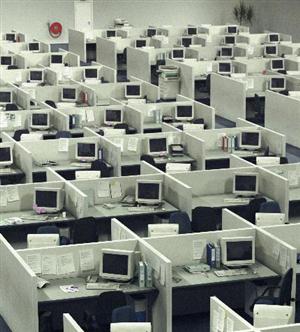 It is no coincidence that I post this article on a Monday. After all it’s the most loathsome day of the week according to most people this side of the galaxy. All because of the very human invention known as work.
It is no coincidence that I post this article on a Monday. After all it’s the most loathsome day of the week according to most people this side of the galaxy. All because of the very human invention known as work.
Some present-day Bartleby (the Scrivener)’s are taking up arms and rising up against the man. A few human gears in the vast corporate machine are no longer content to suck up to the boss or accept every demand from the corner office — take the recent case of a Manhattan court stenographer.
From the Guardian:
If you want a vision of the future, imagine a wage slave typing: “I hate my job. I hate my job. I hate my job,” on a keyboard, for ever. That’s what a Manhattan court typist is accused of doing, having been fired from his post two years ago, after jeopardising upwards of 30 trials, according to the New York Post. Many of the court transcripts were “complete gibberish” as the stenographer was alledgedly suffering the effects of alcohol abuse, but the one that has caught public attention contains the phrase “I hate my job” over and over again. Officials are reportedly struggling to mitigate the damage, and the typist now says he’s in recovery, but it’s worth considering how long it took the court officials to realise he hadn’t been taking proper notes at all.
You can’t help but feel a small pang of joy at part of the story, though. Surely everyone, at some point, has longed, but perhaps not dared, to do the same. In a dreary Coventry bedsit in 2007, I read Herman Melville’s Bartleby the Scrivener, the tale of a new employee who calmly refuses to do anything he is paid to do, to the complete bafflement of his boss, and found myself thinking in wonder: “This is the greatest story I have ever read.” No wonder it still resonates. Who hasn’t sat in their office, and felt like saying to their bosses: “I would prefer not to,” when asked to stuff envelopes or run to the post office?
For some bizarre reason, it’s still taboo to admit that most jobs are unspeakably dull. On application forms, it’s anathema to write: “Reason for leaving last job: hated it”, and “Reason for applying for this post: I like money.” The fact that so many people gleefully shared this story shows that many of us, deep down, harbour a suspicion that our jobs aren’t necessarily what we want to be doing for the rest of our lives. A lot of us aren’t always happy and fulfilled at work, and aren’t always completely productive.
Dreaming of turning to our boss and saying: “I would prefer not to,” or spending an afternoon typing “I hate my job. I hate my job. I hate my job” into Microsoft Word seems like a worthy way of spending the time. And, as with the court typist, maybe people wouldn’t even notice. In one of my workplaces, before a round of redundancies, on my last day my manager piled yet more work on to my desk and said yet again that she was far too busy to do her invoices. With nothing to lose, I pointed out that she had a large plate glass window behind her, so for the entire length of my temp job, I’d been able to see that she spent most of the day playing Spider Solitaire.
Howard Beale’s rant in Network, caricaturish as it is cathartic, strikes a nerve too: there’s something endlessly satisfying in fantasising about pushing your computer over, throwing your chair through the window and telling your most hated colleagues what you’ve always thought about them. But instead we keep it bottled up, go to the pub and grind our teeth. Still, here’s to the modern-day Bartlebys.
Read the entire article here.
Image: Office cubicles. Courtesy of Nomorecubes.


 Social scientists have had Generation-Y, also known as “millenials”, under their microscopes for a while. Born between 1982 and 1999, Gen-Y is now coming of age and becoming a force in the workplace displacing aging “boomers” as they retire to the hills. So, researchers are now looking at how Gen-Y is faring inside corporate America. Remember, Gen-Y is the “it’s all about me generation”; members are characterized as typically lazy and spoiled, have a grandiose sense of entitlement, inflated self-esteem and deep emotional fragility. Their predecessors, the baby boomers, on the other hand are often seen as over-bearing, work-obsessed, competitive and narrow-minded. A clash of cultures is taking shape in office cubes across the country as these groups, with such differing personalities and philosophies, tussle within the workplace. However, it may not be all bad, as columnist Emily Matchar, argues below — corporate America needs the kind of shake-up that Gen-Y promises.
Social scientists have had Generation-Y, also known as “millenials”, under their microscopes for a while. Born between 1982 and 1999, Gen-Y is now coming of age and becoming a force in the workplace displacing aging “boomers” as they retire to the hills. So, researchers are now looking at how Gen-Y is faring inside corporate America. Remember, Gen-Y is the “it’s all about me generation”; members are characterized as typically lazy and spoiled, have a grandiose sense of entitlement, inflated self-esteem and deep emotional fragility. Their predecessors, the baby boomers, on the other hand are often seen as over-bearing, work-obsessed, competitive and narrow-minded. A clash of cultures is taking shape in office cubes across the country as these groups, with such differing personalities and philosophies, tussle within the workplace. However, it may not be all bad, as columnist Emily Matchar, argues below — corporate America needs the kind of shake-up that Gen-Y promises.